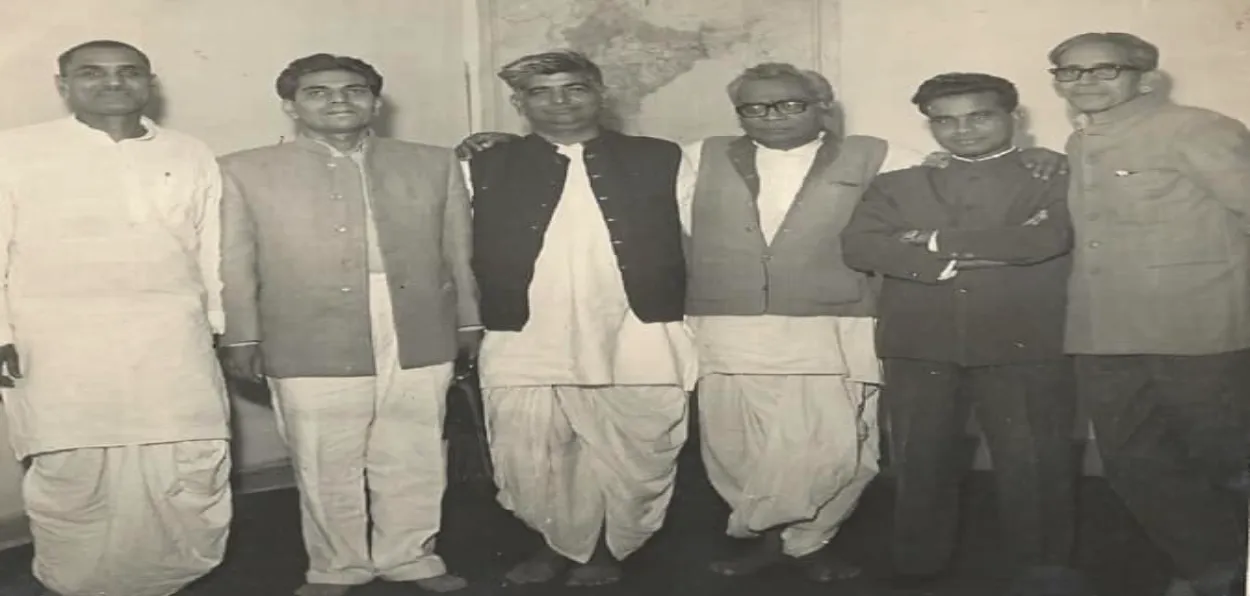
Saquib Salim
It's an interesting fact of history that the teachers of Aligarh Muslim University (AMU) defeated a formidable Indian National Congress led by Jawaharlal Nehru in the 1962 elections. Another startling fact is that it was this political movement at AMU to which one could trace the foundations of the Bahujan Samaj Party (BSP) that came into existence decades later.
A Slice Of History
Student politics is an often discussed subject in academia but the role of teachers remains overlooked. One reason might be the participation of teachers from colleges and universities is rarely overt. There are a few stances when teachers of a university in India contested an election as a political entity. In 1962, teachers of AMU challenged the ruling party of India.
In October 1961, Aligarh witnessed a fierce Hindu-Muslim riot. According to official reports 15 people, all Muslims, were killed during the rioting. Unofficial sources put the figure at 40. A mob entered the AMU campus and shops around the campus were also burnt. Other cities like Moradabad and Meerut in the West UP also saw communal violence as an after-effect.
Congress was ruling Uttar Pradesh (UP) and also at the Center. Naturally, fingers were pointed at Prime Minister Jawaharlal Nehru and Chief Minister C. B. Gupta. Two teachers of the law faculty of AMU, B. P. Maurya, and Abdul Bashir Khan were vocal in criticizing both.
Apart from being a teacher at AMU, B P Maurya was also a dalit leader. Christophe Jaffrelot writes, “He joined Congress in 1941, after Gandhi and other leaders had visited Khair, but he met Ambedkar soon after in Delhi, and he realised that he was 'the real leader' because 'he knew our problems'... He resigned from Congress and joined the SCF in 1948. He returned to Aligarh soon after and completed his L. Sc, LLB and LLM in Aligarh Muslim University where he became Assistant Professor of Constitutional Law in 1960.
"In the meantime he had become the most popular leader of the RPI in Uttar Pradesh. He contested the Aligarh Lok Sabha seat in 1957 and lost, but won in 1962. Aligarh was a non-reserved seat and Maurya had been selected precisely because he had made a point of never contesting elections in reserved constituencies….. For Duncan 'By the beginning of the 1960s, Maurya had become the idol of the Jatavs of Aligarh district, his fame and reputation had spread to surrounding areas and he was well on the way to becoming a Scheduled Caste political leader of national status'.”
Dr. Abdul Bashir Khan was the proctor of AMU at the time of the riots. Paul Brass writes about him, “Dr. Abdul Bashir Khan, professor of law in the Aligarh Muslim University and the leader of a group in university politics commonly dubbed as the "communalist" group, as opposed to the so-called Communist group. It would be less pejorative to say that Dr. Abdul Bashir was a conservative, attached to his identity as a Muslim, who stood for the defense of Muslim interests that he saw endangered by the October riots, during which he was proctor of the university.”
A committee was formed and AMU teachers met like-minded politicians across the West UP. They, with the help of students, started an anti-Congress campaign. B. P. Maurya was already a member of the Republican Party of India (RPI). It was decided that RPI candidates would be backed. In some constituencies, other candidates, mostly independents, were backed through RPI.
In the Vidhan Sabha and Lok Sabha elections held in 1962, RPI surprised everyone. The party won 3 Lok Sabha and 8 Vidhan Sabha seats and several more were won by its allies. In the first of its kind Dalit Muslim alliance at a political level, B. P. Maurya gave a slogan. “Muslim Jatav Bhai Bhai, Biich me Hindu kaha se aaii” (Muslims and Jatavs are brothers, Who are Hindus to come between them).
B. P. Maurya himself contested the Aligarh Lok Sabha seat successfully. He cast 73,571 votes to win the seat and pushed the Congress candidate Jarrar Haider to third place.
Abdul Bashir Khan contested the Aligarh Vidhan Sabha seat successfully as an RPI candidate. He defeated the Congress candidate Anant Ram Verma by a huge margin. Bashir received 42.70% of the total votes polled against Verma’s 31.50%.
Muslim-dominated and riot-affected Moradabad Lok Sabha returned Muzaffar of RPI with a margin of almost 12,000 votes. Hathras Lok Sabha seat, a part of Aligarh district then, was also won by RPI’s Joti Sarup.
RPI performed well in Amroha, Bareilly, Agra, Firozabad, and other Muslim-dominated Lok Sabha seats in West UP. RPI polled 4.26% of the votes polled in UP during the 1962 Lok Sabha elections winning 3 out of 22 seats it had contested. In other constituencies, its allies challenged the Congress hegemony.
In the Vidhan Sabha elections, RPI contested 123 seats and won 8 with 12.32% vote share. Its success came in Muslim-dominated West UP. Mahmood Hasan Khan won Sambhal, Halimuddin won Moradabad City, Purushottam Lal Badhwar won Ujhani (Badaun), Bhagwan Das won Firozabad, Banwari Lal won Fatehabad, Khem Chand won Agra City, Abdul Bashir Khan won Aligarh, and Bhoop Singh won Koil. Almost, on every Vidhan Sabha seat in the region RPI candidates were either winner or runner-up.
Several seats were won by allies. For example, the Iglas Vidhan Sabha seat, in Aligarh district, was won by Thakur Shivdhan Singh as an independent who had the support of the AMU-RPI group.
ALSO READ: Why deepening India-Uzbekistan ties are good for the region
B. P. Maurya and Abdul Bashir Khan laid the foundation of RPI with the election symbol elephant, a symbol later adopted by Kanshiram’s BSP. The Muslim Jatav alliance later paved the way for the surge of BSP’s politics in West UP. The election also ended the domination of Congress as a political force in the West UP and it could never recover from this jolt afterward.
